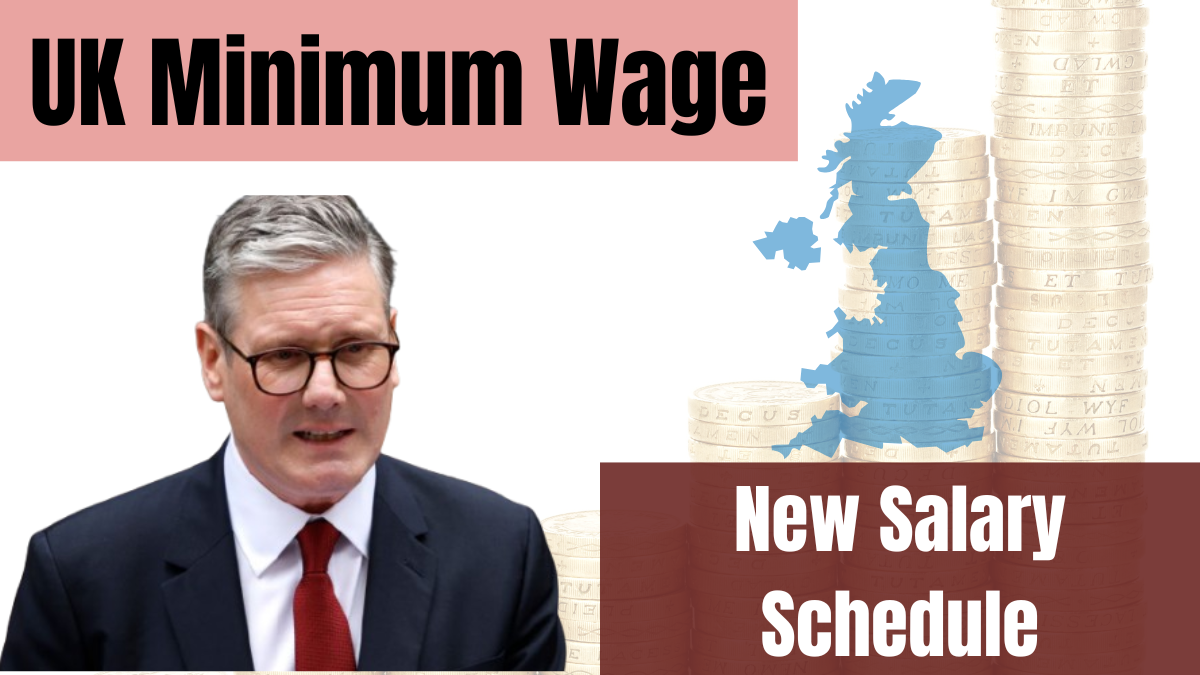Starting April 1, 2025, the UK Government will implement new minimum wage rates to help workers cope with rising living costs. The National Living Wage (NLW) for workers aged 21 and over will increase to £12.21 per hour, a 6.7% rise from last year.
The new rates apply across all age groups, ensuring fair pay increases for younger workers and apprentices.

UK Minimum Wage 2025 – Complete Breakdown
| Category | 2024 Rate (£) | 2025 Rate (£) | Increase (£) | Increase (%) |
|---|---|---|---|---|
| National Living Wage (21+) | £11.44 | £12.21 | £0.77 | 6.7% |
| 18–20 Year Old Rate | £8.60 | £10.00 | £1.40 | 16.3% |
| 16–17 Year Old Rate | £6.40 | £7.55 | £1.15 | 18.0% |
| Apprentice Rate | £6.40 | £7.55 | £1.15 | 18.0% |
| Accommodation Offset (Daily) | £10.66 | £11.33 | £0.67 | 6.3% |
This marks one of the biggest annual wage increases, particularly for younger workers.
Understanding the National Minimum Wage and National Living Wage
The UK has two main types of regulated wages:
- National Minimum Wage (NMW): Applies to workers under 21 and apprentices.
- National Living Wage (NLW): Applies to all workers aged 21 and over, ensuring a higher minimum hourly rate.
The Low Pay Commission (LPC) reviews and updates these rates annually, ensuring fair compensation based on economic conditions and inflation.
How Will the New Wage Rates Affect Workers?
1. Increased Earnings for Full-Time Workers
A full-time worker (37.5 hours per week) on the NLW will see their annual earnings increase from £22,918 to £24,441, a £1,523 rise.
2. Financial Security for Younger Workers
- 18–20-year-olds will now earn £10.00 per hour, a 16.3% increase.
- 16–17-year-olds and apprentices will earn £7.55 per hour, up 18% from last year.
- These raises encourage young workforce participation and improve financial stability.
3. Better Protection Against Inflation
- The wage hikes help workers keep up with the rising cost of living.
- Employees will have greater budget flexibility for savings, investments, and debt reduction.
How Can Workers Ensure They Receive the Correct Wage?
Employees should take these steps to confirm they are being paid correctly after April 1, 2025:
- Check Payslips: Ensure your employer is paying the correct rate according to your age.
- Report Underpayment: If your employer does not follow the new rates, report the issue to HR or Acas (0300 123 1100).
- Plan for Higher Earnings: Use the additional income for savings, debt reduction, or essential expenses.
Workers should be proactive in monitoring their pay to avoid any discrepancies.
How Will Employers Be Affected?
While the wage increase benefits employees, businesses must prepare for higher payroll costs.
Key Challenges for Businesses
- Increased Payroll Expenses: Industries like retail, hospitality, and healthcare will face higher wage bills.
- Legal Compliance Requirements: Employers must update payroll systems before April 1, 2025 to avoid penalties.
Consequences of Non-Compliance
| Issue | Penalty |
|---|---|
| Failing to meet minimum wage laws | Fines of up to £20,000 per underpaid worker |
| Repeated violations | Public listing as a non-compliant employer |
| Legal action | Potential court cases and reputation damage |
Employers must take proactive steps to ensure compliance with the new rates.
How Businesses Can Prepare for the Minimum Wage Increase
To adapt to the new wage regulations, businesses should:
- Update Payroll Systems: Ensure all wages are adjusted to meet the new rates.
- Train HR & Payroll Teams: Equip staff with updated wage policies to assist employees.
- Communicate Changes: Inform workers about their new pay rates well in advance.
Employers must review their budgets carefully to accommodate the higher wage costs without affecting business operations.
Frequently Asked Questions (FAQs)
1. When will the new UK minimum wage rates take effect?
The new rates will apply from April 1, 2025.
2. Who qualifies for the National Living Wage?
All workers aged 21 and over will receive the National Living Wage of £12.21 per hour.
3. How much will a full-time worker earn under the new rates?
A full-time worker (37.5 hours per week) on the National Living Wage will earn £24,441 per year, up from £22,918.
4. What should I do if I’m not being paid the correct wage?
- Speak to your employer or HR department.
- If the issue is not resolved, contact Acas (0300 123 1100) to report wage violations.
5. How will the wage increase impact businesses?
- Employers must increase wages for all affected workers.
- Failure to comply may result in fines, legal action, and reputation damage.
6. What industries will be most affected by the wage increase?
Sectors like retail, hospitality, healthcare, and customer service will see the highest payroll impact due to the wage hike.
7. Where can I check for official updates on UK minimum wage laws?
For official wage policies and updates, visit:
| Resource | Official Link |
|---|---|
| UK Government Minimum Wage | www.gov.uk/national-minimum-wage-rates |
| Acas – Employee Rights & Wage Disputes | www.acas.org.uk |
Conclusion
The UK Minimum Wage 2025 update is a positive step for workers, ensuring fair pay in response to rising living costs. While employees benefit from higher earnings, businesses must prepare for increased payroll expenses and ensure compliance with wage laws.
By staying informed and understanding their rights, workers can maximize their earnings, while businesses can avoid legal risks by implementing wage adjustments before April 1, 2025.
Click here to know more.
Aanchal is a passionate writer with a keen interest in storytelling, content creation, and creative expression. She enjoys exploring diverse topics and crafting engaging narratives that captivate readers.
